News
Endless threats to public health as open defecation persists
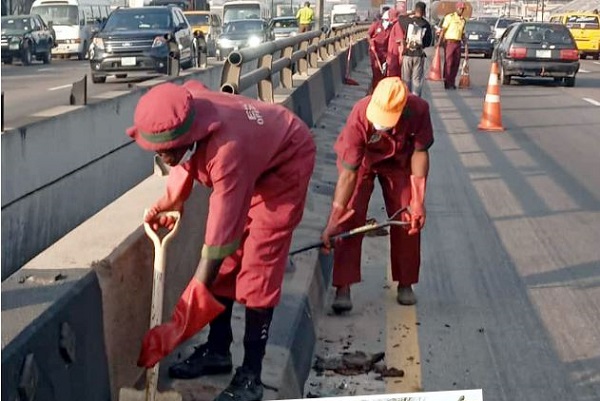
Why practice persists in Lagos, Kaduna, Kano, Niger, Ebonyi, Bauchi, others
A common sight in Nigerian cities and rural communities is the post warning residents against defecating in open places. The sing song is: “do not defecate or urinate here,” with the accompanying threat: “offenders will be prosecuted”. Unfortunately, the warning/threat is most often complied with in the breach. The common post aimed at stopping open defecation, compared with others like “No Parking”, “No Loitering” and “This property is not for sale”, which the public usually obey, has mostly failed in respect of open defecation as reported by PRECIOUS IGBONWELUNDU, ALAO ABIODUN, FAITH YAHAYA, ABDULGAFAR ALABELEWE, ONIMISI ALAO, DAVID ADENUGA, JUSTINA ASISHANA, FANEN IHYONGO, LINUS OOTA, OGOCHUKWU ANIOKE and ROSEMARY NWISI
In the heart of Nigeria‘s bustling cities and sprawling rural communities lies a deeply troubling issue that defies modern sensibilities: open defecation. This age-old practice, often borne out of necessity, has turned public spaces, waterways and residential areas into unsanitary landscapes, threatening public health, environmental sustainability and human dignity.
For many Nigerians the toilet is not only the conventional structure fortified with toilet seats and water closets; it can be anything open-fields, bushes, roadsides and waterways. The sight, sound and stench of open defecation are a stark reminder of the systemic challenges the country faces in sanitation and public health.
It is usually a harrowing scene beholding heaps of human waste dot the edges of crowded markets, overhead bridges, rail tracks, motor parks and even pedestrian walkways in Lagos; clog drainage channels in Kano and Kaduna and pollute streams in the Niger Delta.
In rural areas, children play in spaces contaminated by human faeces, unaware of the health risks. In urban slums, overcrowding and lack of access to basic sanitation facilities leave residents with no alternative but to defecate on the streets or in plastic bags, which are then indiscriminately discarded.
In some cases, the situation escalates from the unsightly to downright hazardous. During rainy season, human waste washes into open wells, streams and rivers, which serve as the primary water sources for many communities. This contamination leads to outbreaks of waterborne diseases such as cholera, typhoid, and dysentery.
In 2023 alone, more than 5,000 cases of cholera were recorded across Nigeria, with open defecation identified as a significant contributing factor. This year, many states including Lagos, Niger and Ebonyi are still battling cholera outbreaks that have killed several hundreds and left many more hospitalised.
The practice also has profound social implications. Women and girls, often forced to seek privacy in remote areas, become vulnerable to sexual harassment and assault. Besides the immediate health and safety risks, the indignity of defecating in the open strips individuals of their basic humanity, perpetuating cycles of poverty and shame.
Grim statistics
According to the United Nations Children Education Fund (UNICEF), as of 2023, approximately 48 million Nigerians still lack access to safe toilets. The organisation’s 2021 Water Sanitation and Hygiene National Outcome Routine Mapping (WASHNORM) report indicated that 48 million people in Nigeria practice open defecation; only 10 per cent of the population has access to basic water, sanitation and hygiene services while only eight per cent practices clean hand washing.
The report further stated that the percentage of household members who practised open defecation varies by region: North Central (53.9%), Southwest (28.0%) and Northwest (10.3%).
Another UNICEF report published in September revealed that almost 2,000 children under the age of five die daily in low and middle income countries due to air pollution-related illnesses.
Dangers of open defecation
According to an environmental scientist, Dr Umar Shehu, open defecation not only poses a health risk to ground water but contaminates foods, fruits and vegetables sold in the open. Shehu said: “Most of the foods we buy from the open market are at risk of contamination.
“These contaminations can happen in so many ways. For example, most of the people who sell food and fruits that we buy and consume directly are people who don’t have access to good toilets.
“Yet, after engaging in open defecation without washing their hands with soap or even washing at all, they come back to peel that orange, slice that watermelon and touch other food that we buy and eat directly.
“Another way of contamination through food is that behind or beside almost every market around, you see a refuse site where people defecate openly.
“What that means is that the breeze can lift dirt from that refuse site and drop it on our garri, flour and other food items left open in the market.
“The dangers of open defecation are just too many to mention.”
Lagos’ many efforts, little results
In 2003, the Lagos State Government started a campaign to punish those who urinate, defecate or throw water sachets carelessly on the road with two to three months imprisonment or a fine between ₦2,000 and ₦10,000. Unfortunately, the story has changed, and our communities remain plagued with open defecation.
Our correspondent’s trip to some popular areas in Lagos metropolis, Iyana-Ipaja, Ikotun, Ilaje-Bariga waterfront, Ejigbo, Isolo, Oshodi rail track and park, Oko-Oba Agege, Oyingbo and Makoko was intermittently interrupted by unpleasant smell of urine as well as fresh and congealed faeces.
In August this year, the Lagos State Ministry of Environment and Water Resources intensified its clean-up of the Ojodu-Berger highway median as part of its effort to end open defecation. The Ogun State Environmental Protection Agency also joined in the effort aimed at giving residents and commuters along that stretch some respite.
But a recent visit to the axis showed a despicable sight. Lumps of fecal waste and droplets of urine with offensive odour forced their way through the nostrils, sending wrong signals to the brains and other organs.
It was bulk-passing game when our correspondent sampled opinions to unravel the goings on in the minds of the people responsible for polluting and defacing the environment. The traders blamed residents who do not have pit latrines in their homes while the residents also blamed street urchins for the ugly trend.
At the Ilaje area of Lagos, our correspondent observed many people, including adults and children excreting into the lagoon. The surroundings grossly lacked the level of hygiene expected of a place where smoked fish is processed and sold for public consumption.
Ebonyi tops prevalence chart
Ebonyi State is reputed for having the highest prevalence of open defecation in Nigeria with 73 per cent, as only seven per cent of the state’s inhabitants have access to safely managed water.
Also, 78 per cent of the inhabitants drink water contaminated with E. coli while only two per cent have access to basic hygiene services.
The General Manager (GM) of Ebonyi State Rural Water Supply and Sanitation Agency (EBRUWASA), Agwu Joseph, described the water sanitation and health situation in the state as pathetic and dangerous.
He said the administration of Governor Francis Nwifuru has revitalised the moribund agency and paid its counterpart fund of N200 million for the Partnership for Expanded Water, Sanitation and Hygiene (P-WASH).
“As a result, over 51 boreholes have been dug in various communities of the rural areas in the state,” he said.
However, this is said to be grossly inadequate as many communities have no potable water. Sources told our reporter that more than 98 per cent of boreholes dug across various communities in the state have parked up owing to non-maintenance.
On open defecation, it was gathered that no local government in the state is free of the problem.
A resident of Abakaliki, Ifeoma Ezeaku, said there used to be a task force against open defecation, but over the years, the task force had become less active.
Investigation by The Nation showed that the state allocated less than two per cent of its budget to WASH. No dime was allocated to the Ukawu Water Scheme, an uncompleted water project started by the Martin Elechi administration, in the 2024 budget.
The situation is worse in rural areas as many people don’t have toilet facilities.
The Commissioner for Water Resources, Chinedu Nkah, told our reporter: “We are also building toilets. Lack of toilet facilities is another major source of cholera outbreak.
“It is very dangerous to defecate in the bushes because when the rain falls, it washes the whole thing back to the water and the community people will drink it, and it becomes a serious problem,” he said.
Why menace persists in Kaduna, others
With multidimensional poverty, lack of access to water and inadequate toilets plaguing northern Nigeria, open defecation remains a hard nut to crack. In Kaduna State, 14 of the 23 LGAs and approximately 600,000 people still practice open defecation.
The remaining nine LGAs, representing 39 per cent of the population, have attained the ODF status.
While adults, especially females, appear to go into hiding, using the potty or polythene bags to throw their faeces into nearby bushes or gutters, children innocently and playfully climb to the top of refuse heaps to defecate.
Save for public schools and hospitals, there are no free public toilets in Kaduna. Most of those who engage in open defecation cannot afford to patronise the commercial toilets popularly called Gidan Wanka, which are available in markets, motor parks and mechanic workshops.
Low-income residents like artisans, labourers, bus conductors and porters in the market consider it a luxury to use the commercial toilets that charge between N150 and N200.
Like many other states, Kaduna has faced challenges with pipe-borne water for over a decade. This has led to the collapse of the toilet systems in many homes, especially those that cannot afford to sink boreholes.
But the government has been working in partnership with UNICEF and other international and local partners to stamp out open defecation in the state.
At the event where the nine LGAs were declared ODF (open-defecation free), Kaduna State Deputy Governor Hadiza Sabuwa Balarabe, a medical doctor, noted that the health indicators of the state (2007-2021) told a sobering story.
She said: “Preventive health measures accounted for just 5.3%, while curative efforts stood at a stagnant 23.0%. These figures are unacceptable and clearly show the need for a paradigm shift.
“We must focus more on preventing diseases rather than solely reacting to their consequences. This further stresses the urgent need to end open defecation.”
Kano takes lead for ODF attainment
For Kano State, 26 LGAs have been declared ODF. Though open defecation practice remains predominant in 18 local government areas, UNICEF while acknowledging the state’s efforts to address the menace said only two per cent of Kano’s population still practice open defecation.
Although there are toilets in public places in the state, they are largely owned and run by private individuals who charge a fee for their use.
UNICEF Water Sanitation and Hygiene (WASH) Specialist, Malam Uba Lawal, said the increasing level of open defecation in Kano State was due to the increase in the prices charged by the toilet owners in the metropolitan areas.
Niger’s ultramodern markets, model schools without toilets
The story of open defecation is the same in Niger State despite claims by the government that the practice was in decline.
Niger has a big ultra-modern market in Minna, the state capital, a big daily retail market that is heavily patronised called PZ, and several weekly markets in the rural areas.
The Kure Ultra-Modern Market in Minna has only two public toilets, which are privately run. One of the public toilets is located at the extreme edge of the market, making it difficult for some of the traders at the other end to access.
The second toilet is located outside the perimeter fence of the market, mostly suited for traders whose shops or stalls are situated outside the fence.
But most of the traders do not use it as some of them protested paying money ‘just to defecate’.
At the PZ retail market, there are no public toilets except for some of the plazas whose washrooms are for use by shop owners.
A visit to the Model Science College, Bosso, Bosso Secondary School and Government Model Science College, Tundun Fulani, revealed the deplorable state of toilet facilities there, which have left students defecating in nearby bushes.
Nkangbe Primary School, Gidan Mangoro Primary School and the Day Secondary School, Birji also suffer the same fate. Some of the teachers who live nearby said they go to their houses when pressed.
Deputy Director, Environmental Health in Niger State Ministry of Environment, Jibril Katamba Naimi, said massive awareness and sensitization campaigns were ongoing for people to build and use toilets.
Absence of legal framework feeds open defecation in Adamawa
It was then Commissioner of Water Resources, Hassan Kaigama, who in 2022 regretted that the government could not move against people who practise open defecation in Adamawa State due to the absence of legal backing.
“Defecation in open places is rather out of hand because there are no laws to prosecute offenders,” Kaigama had said.
In response to that revelation, Governor Ahmadu Fintiri, in December 2023 signed a policy document titled: “Harmonised Water Resources and Water Sanitation and Hygiene (WASH) Policy”, designed in collaboration with the United States Agency for International Development (USAID) and other partners to promote the idea of safe drinking water, sanitation and hygiene.
At the signing of the policy, Fintiri stated that provision of water was a top priority for his administration, adding that he would do a lot with the policy to increase happy outcomes.
However, little has been done in that regard. The water that most residents of Yola use comes from private boreholes conveyed to homes by water vendors, who with current inflation charge between N1,000 and N2,000 for a cart containing twelve 25-litre jerry cans.
Even in government offices, toilets are not readily available. Toilets which are typically shared to offices in the premises are locked up and keys held by the workers to whom such toilets are allocated.
Epidemic looms in Bauchi schools over poor toilet sanitation, water scarcity
A looming epidemic threatens the health and safety of students in Bauchi State as poor toilet sanitation and severe water scarcity in schools continue to put children at risk.
Our correspondent, who visited Community Day Secondary School, Wunti Dada, a UBEC/SUBEB 2015 Project located on the outskirts of Bauchi metropolis, observed that the surrounding areas of the uncovered four-room toilet facility were polluted by scattered excreta.
The Nation reports that the school, hosting about 1,000 students at both the junior and secondary levels, is one of the public schools in Bauchi battling with poor toilet sanitation.
Speaking in an interview with The Nation, some of the teachers said the deplorable conditions have not only impacted on the overall hygiene and well-being of students but also posed serious challenges to the learning environment.
A teacher, who preferred anonymity, said: “The condition of the toilets in our school is appalling. They are not only unhygienic but also breeding grounds for various health issues.
“It is disheartening to see students struggling with such necessities. The female students are suffering. Some of them, if they say they want to urinate, they use that as an opportunity to avoid learning.
“Some of them see it as an opportunity not to come back. Even when they come back, another period is gone. Some of them find it difficult to learn because they are not used to it.
“All the toilets here are in bad shape. Even houses close to the school have started complaining. And there is no way we can stop them because we can’t allow them to urinate in their classrooms.”
According to findings, more than half of young girls who drop out of school do so due to poor water, sanitation and hygiene (WASH) facilities.
Also, statistics from WASH National Outcome Routine Mapping, 2021, revealed that 97 per cent of public places across Bauchi State do not have basic WASH facilities for public use while 72 per cent of the schools in Bauchi do not have access to basic Water, Sanitation, and Hygiene (WASH) facilities needed by students and teachers.
When contacted, the Public Relations Officer (PRO) of SUBEB, Mohammed Abdullahi, said the board was aware of the dilapidated toilets in the government-owned schools.
Abdullahi assured that “part of our action plan for the year will be the renovation of dilapidated classrooms and the construction of toilets, boreholes, and fences. We will also provide them with school gardens and sporting facilities.”
In Nasarawa school, teachers, pupils used one latrine for 30 years
Until three weeks ago, students and teachers of Government College Doma, built in 1980, queued in front of the single pit latrine to do their business.
Those who could not endure the long wait either had to trek into nearby bushes or go back home to relieve themselves.
But respite came their way just three weeks ago when the Chief Press Secretary (CPS) to the Governor, Ibrahim Addra, provided a Water Cistern (WC) for their use.
The school’s Vice Principal, Othman Ogaji, confirmed that the teachers used to defecate in the bushes, noting that trekking to and fro the bush disrupted their productivity and affected academic activities.
The absence of good toilet facilities is not peculiar to the above secondary school. About 85 per cent of public primary and secondary schools do not have toilet facilities.
Also, most of the headquarters of the 13 local government areas of the state do not have functional public toilets. Ironically, the chairmen of these local governments are tasked with the responsibility of providing good toilet facilities for public use and water.
Different strokes for different folks
Mrs. Barakat, a market woman at Oyingbo seemed unbothered by the stench oozing out of the surrounding that could make the uninitiated to puke.
“We are used to this smell. It appears you’re new here. There are some traders that sleep in the market over the night, and they mess up the area with their faeces. This is the kind of stench and filth we endure daily just to sell our goods,” she said with nothing in her countenance showing she was badly affected.
At Oshodi market, one of the traders, Mrs. Jimoh said: “For me and some other women here, we urinate in some corners at the market. Because we have to pay money before we use the toilet, we are left with no option than to look for a place to ease ourselves.”
A homeless young man popularly called Ejo, said in Pidgin English: “We no get money to dey use toilet. How much we dey collect? We dey sleep and wake for under the bridge, with no work. Instead I go use the money smoke sef.
At Ejigbo and Ije-Ododo areas of Lagos, some of the canals were littered with faeces. Cattle also defecated and passed urine in the canal.
A market leader in Isolo, Alhaji Alimi said: “This has been a problem and it is not limited to our area alone.
“We believe governments, private firms and religious centres should invest in building more public toilets, especially mobile toilets and other public facilities that are free.
“Also they should continuously sensitise the public against open defecation.”
Mummy Hajarat, a businesswoman in the Maitama Ultra-Modern Market in Kubwa Area of the Federal Capital Territory (FCT), was seen making her way out of the toilet in the market.
In a brief chat with our correspondent she explained that she usually went to that particular toilet because it was properly maintained.
“I am a businesswoman in the market. I sell food, and as a businesswoman who expects to make sales, I have to be around in my shop. I cannot lock my shop and run home anytime I am pressed. To avoid being absent whenever customers come around, I went around the market and discovered that this particular toilet (Ayuba toilet) is the neatest and well-maintained. “So, as far as I do my business in this market, this is the toilet I will be using. It is the neatest and I don’t mind the cost. We used to pay N20 to urinate and N50 to defecate but now it is N50 and N100, respectively. The price is okay for me.
Asked if she had ever treated an infection as a result of using the public toilet, she said: “At times, there is a way I position myself when I want to use the toilet, I don’t squat fully and so far, I have not had reason to treat any infection.”
Kabir Musa, who is in charge of the toilet, said: “We need to keep this place clean and the only way we can do that is if we have adequate water, detergent and other cleaning agents. The little money we charge our customers is what we use to run this place.
Another toilet at the exit gate of the marketplace enjoys less patronage. In response to our inquiry, the idle operator simply said: “People no get money to chop. The small money wey dem get na food dey go use am buy”.
Despite having five toilets at different corners of the market, some traders and customers still said they prefer to use the bush, roadside, or car parks.
Mummy Funmi, a dealer in used clothes popularly called ‘Okrika’, said she stopped using public toilets after spending so much money to buy antibiotics to treat infections she suspected were contracted from using them.
She said: “Since I discovered that I treat toilet infections often, I have decided to look for a nearby bush around the market or an uncompleted building to defecate whenever I am pressed. Since I started open defecation, I have not had reasons to treat toilet infection.”
Aminu Yusuf, a POS operator at the Kure Ultra-Modern Market in Niger, wondered why he has to pay to ease himself when the government is supposed to provide free public toilets.
Sarah, who fries soya beans outside the market fence, also lamented the lack of access to the toilet, adding that she helps herself in any free space when the need arises.
Efforts to combat open defecation
Recognizing the gravity of the issue, the Nigerian government launched the “Clean Nigeria: Use the Toilet” campaign in 2019. Spearheaded by the Federal Ministry of Water Resources, the campaign aimed to make Nigeria open defecation-free (ODF) by 2025. With a mix of public awareness, community engagement, and infrastructural investments, the initiative sought to promote the construction and use of household and communal toilets.
The Minister of Water Resources and Sanitation, Prof. Joseph Utsev, ahead of the Clean Nigeria Campaign Strategic Plan’s launch and the commemoration of the 2024 World Toilet Day, themed “Toilets: A Place for Peace,” said attaining the ODF status in Nigeria involves more than building toilets. He revealed that the country needed 11.6m toilets to meet its 2030 ODF target.
According to him, 135 Local Government Areas (LGAs) and over 30,000 communities have achieved the ODF status since the inception of the “Clean Nigeria: Use the Toilet Campaign in 2019”.
State governments have also joined the fight. In Ekiti, Bauchi, and Jigawa states, Community-Led Total Sanitation (CLTS) programmes have empowered local leaders to champion the cause. These programmes encourage communities to take collective responsibility for sanitation, ensuring every household has access to a toilet.
Speaking during a Live Space on X, Lagos Environment and Water Resources Commissioner, Tokunbo Wahab, acknowledged the challenges of open defecation.
He gave insights on the special topography of Lagos, its landmass and population, which all contributes to sanitation and environmental challenges.
“…Lagos also houses 10% of the country’s population, and they are still coming daily because Lagos is their own New York or London, which is okay.
“All these put together makes Lagos a melting pot for the country called Nigeria and throws up the environmental challenges that we now experience in Lagos.
“Some of them are existential. There’s little we can do about them. But as a people, our resilience is for us to make it better, and that is what the government of Governor Babajide Olusola Sanwo-Olu and his Deputy, Dr. Obafemi Hamzat, have been doing in the past few years.
“Putting in place infinite infrastructure to help discharge our storm water and reduce the issues, bordering on flooding and flash flooding. Putting in place resilient infrastructure to help us out with the 13,000 tons of municipal solid waste that we generate in a day. “Putting in place for the future, infrastructure to help us manage the liquid waste and sewage system for the state called Lagos.
“Also, working around the system to ensure that we have pipe-borne water in our homes in the next few years by activating the biggest water infrastructure we have in Lagos with 70,000,000-gallon capacity per day.
“If we get this going by the grace of God, in the next few months, because contractors are working assiduously, the cause and effect on our health will be unquantifiable.
“The same governor and his deputy are also working round the clock to ensure that years to come, we have in place a policy that will discourage open defecation by working out advocacy, awareness, and enforcement because it’s been bad.
“They are also putting in place infrastructure to ensure that we have additional 100 plus public toilets across the states. We are Lagos. We are very proud of all these things. Are we there yet? I will tell you no. But we are on a journey to get there soon.”
The Niger State Government, in the 2024 budget approved N30 million for the construction of 500 latrines in communities across the state using a community-led sanitation concept. This would give two toilets to a community per ward if it is implemented. About N211 million was approved for the provision of boreholes and latrines for community WASH education centres statewide and another N30 million for the construction of 30-compartment toilet latrines across the three geo-political zones in the state.
Also, N20 million was approved for a statewide open defecation programme while the N35 million approved for the same programme in 2023 was not accessed.
Also in the budget, 0.88 per cent amounting to N5.19 billion was earmarked for the water and sanitation sectors. According to the Ministry of Water and Dams Development, the state aims to improve water infrastructure, expand access to potable water sources, and implement effective sanitation measures.
The Nasarawa state government through the Commissioner for Environment, Kwanta Yakubu, introduced monthly sanitation exercise. But the scarcity of water and incessant national grid collapse have not helped matters.
The state government said it was not going back on enforcement as 61 persons were recently arrested over alleged violation of the law against open defecation.
The Permanent Secretary, Ministry of Environment told our Correspondent that the suspects were later released after agreeing to comply with the directive to build toilets in their facilities, though they were each fined N50,000 to serve as a deterrent to others.
Non-governmental organizations (NGOs) and international partners, including UNICEF, WaterAid, and the World Bank, have also played pivotal roles. Through funding and technical expertise, they have supported the construction of sanitation facilities in schools, markets, and healthcare centers across the country.
Why does the problem persist?
Despite these efforts, Nigeria remains the country with the highest number of people practicing open defecation in Africa, and the second highest globally, trailing only India. Experts attribute this menace to poverty and inequality, cultural barriers, inadequate infrastructure, weak governance and population growth.
According to them, over 40 per cent of the population live below the poverty line and struggle to meet food and shelter needs and so, building or using a toilet is seen as an unaffordable luxury.
Local governments, tasked with the responsibility of sanitation management, often lack the resources or capacity to enforce regulations.
Also, Nigeria’s rapidly growing population exacerbates the problem. With over 200 million people, the demand for sanitation infrastructure outstrips supply, leaving millions in the lurch.
To Zikora Ibeh, the Senior Programme Manager, Corporate Accountability and Public Participation Africa (CAPPA), decades of awareness and sensitization campaigns by government and non-governmental organisations have not succeeded in eradicating the practice because of poverty, homelessness, poor housing, inadequate public water infrastructure and sanitation systems.
She noted that the menace was worse in urban cities due to housing, water and sanitation provision lagging behind population growth.
Quoting available statistics, Ibeh noted that the country has a housing deficit of no less than 28 million with at least 700,000 newly built housing units needed annually to plug the gap.
“This means tens of millions are homeless across the country. Especially in Lagos with a population of over 20 million, millions of people often sleep under overhead bridges, motor parks, inside school classrooms and roadside shops.
“Without any access to lavatory and sanitation systems, open defecation is the only way these people can relief themselves. There is also another layer who are forced to squat with friends and families due to the housing crisis.
“While they are better off than those who sleep under the bridges, squatting often leads to overcrowding that puts pressures on existing water and sanitation facilities.
“The sharp increase in rent especially in major cities due to inflation and other macro-economic indices is also a factor in the prevalence of open defecation.
“As more and more people are forced by escalating rents to move into slum settlements in the suburb, they are compelled to make a trade-off between affordable rent and lack of access to essential facilities like toilet, water and sanitation systems. Housing conditions in poor and slum settlements are often unplanned, threadbare and without the accompaniment of the basic facilities and comfort that housing units within cities have.
“Also, public infrastructures like electricity, pipe borne water supply and planned waste disposal systems are often either absent or insufficient in slum settlements due to the informal manner these communities often emerge thereby further compounding the crisis of open defecation.
“Another important factor is the absence of public toilets in many urban conurbations like Lagos which commuters can utilize when suddenly pressed. Given the challenge of Lagos traffic, many commuters are constantly in need to relief themselves.”
According to her, the government has failed over the years to tackle the problem at the root while simply concentrating on awareness and sensitization.
Call to action
To address the problem, Prof. Utsev outlined some Federal Government’s initiatives, including the Declaration of a State of Emergency in the water supply hygiene and sanitation (WASH) sector; the National Action Plan to revitalise the sector; the Partnership for Expanded Water, Sanitation, and Hygiene (PEWASH) Programme, the Sustainable Urban and Rural Water Supply, Sanitation, and Hygiene (SURWASH) Programme, as well as the Presidential Executive Order 009 as measures to achieving an ODF status by next year.
For the Minister, there was need for a strong collaboration from states and local governments, international organisations, private sector partners, civil society organisations, the media, and the public to achieve the universal access to sanitation by 2030 through the Clean Nigeria Campaign Strategic Plan.
Ibeh said the government should first invest in standard public housing in order to resolve at least 30 percent of the crisis of open defecation.
“Secondly, all government buildings including schools and hospitals must have functioning toilets. The government must also ensure that all private developers build in adherence to authorized prescriptions and that no residential or commercial building can be erected without provision for modern toilets facilities.
“The availability of piped water is essential to the functioning of modern toilet and sanitation system. Therefore, the government must rejig and invest in the public water corporations to ensure adequate water supply for use at homes and by industries…” she stated.
Campaigns against open defecation have been intensified in Rivers State.
Currently sensitization/enlightenment and training programmes are ongoing in some Local Government Council Areas where the State Government is conducting pilot scheme towards ending open defecation in the State by the year, 2030, the Nation learnt.
Speaker Victor Oko-Jumbo led State House of Assembly on July this year passed a resolution that public toilets facilities be built across the 23 local government areas of the State, as a way of curbing open menace of open defecation in the State.
The Lawmakers equally advocated for regular monitoring, evaluation and active participation of relevant ministries and stakeholders in the fight against problem.
In compliance with the resolution, the State water supply and sanitation Agency
has since kick-started enlightenment and train the trainers programme in four selected Council areas, each from the senatorial zones of the State, to pave way for the project construction proper.
The LGAs are: Akuku-Toru, Ogba/Egbema/Ndoni; Ikwerre and Opobo/Nkoro.
The Acting General Manager of the Rivers State water supply and sanitation Agency, Napoleon Adah, who disclosed this to the Nation in Port Harcourt, assured that the State Government is not resting on his oars to ensure the State meets the 2030 Global Millennium Goals target to end open defecation across the World, including Nigeria.
Speaking to our Reporter, via a telephone interview, Adah said, “As a State, we’re presently intervening to end open defecation in four local government areas, it is like a pilot scheme, meaning that the intervention would later be expanded to accommodate more areas and then the entire State as the programme progresses.
“We have intensified campaigns, sensitizing all communities and villages in the four council areas on the need to do away with open defecation.
“Already the State House of Assembly have resolved and directed that public toilets should be constructed across the 23 Council areas of the State to ensure that it is available for users; travellers at all times, and that is the campaigns we’re carrying out in the rural communities where we’re currently working.
“As a State Agency that is saddled with the responsibilities of campaigning, teaching, building and enforcing the Lawmakers directive on this matter, we have been touring around these LGAs, conducting train the trainers programme on WASH, which is targeted at eradicating open defecation in our various communities.”
He expressed the Government’s determination and efforts at ensuring the eradication of the growing menace in the State, especially with the growing population of slump residents due to hardship and high cost of accommodation, living in the country.
“I can assure you that the Rivers State Government, under the Leadership of Sir Siminalayi Fubara is determined to end open defecation across the State and the Ministry of Water Resources on whose purview this programme being implemented is not leaving any stone unturned in ensuring that Rivers State achieves open- defecation-free target by the year, 2030.”
Asked if construction of sanitation facilities have already started in the council areas as directed by the State Lawmakers said, it is the next phase after the LGA and community enlightenment, training programme.
“It is after we have completed the enlightenment/training programmes in the communities and LGAs that construction will begin. Don’t forget that there are technicalities associated with this kind of project, like project plans and designs before the construction proper will start.
“I don’t entertain any doubt that in due time, government sanitation facility will be constructed in public places across the State, markets, churches, motor parks among others.
Before now, the Rivers State Government and UNICEF, under the Niger Delta WASSA programme have provided toilet facilities and water in communities in Akuku-Toru and Opobo/Nkoro council areas, the Federal Ministry of Water and Sanitation has equally done same in some other places in the State like ONELGA, Tai, Akuku-Toru, Ikwerre and Ahoada East.” Adah explained.
Speaking further, the Acting General Manager revealed that the burden of open defecation is more among those living in slumps and waterfronts where sanitation facilities are not considered and where they manage to build one, the way they are built does not encourage usage.”
He called on Council Chairmen in the 23 LGAs to support State Government’s efforts on this, by ensuring that every home and houses in their localities have functional sanitation facilities, including public places, markets and motor parks, as well as worship centers.
He also called on them to equally enforce compliance, assuring that with that, the challenge of open defecation would be a thing of the past on the State if all hands are on deck.
News
Ondo gov poll: S’West PDP urges IGP to probe allegedcompromise by security personnel

The leadership of the People Democratic Party (PDP) in the Southwest has called on the Inspector General of Police to probe the alleged compromise by the security personnel in the just concluded Ondo State governorship poll.
The party, in a statement issued at the end of the Southwest zonal exco meeting by the Publicity Secretary, Chief Sanya Atofarati expressed utter disappointment over the alleged poor conduct of the poll, alleging security agencies compromised the election.
The party regretted that despite high expectations that the governorship poll would be better organised and managed after the ‘poorly conducted Edo election’, the exercise was marred by noticeable lapses on the part of the INEC and the security agencies.
The party noted that despite the security agencies’ preparedness and assurance to provide a level playing ground for all the political parties, the security personnel posted to Ondo State for election were heavily compromised in favour of the APC.
It added that the governorship poll failed integrity tests and fell short of the global standard of credibility considering the widespread lapses including malfunction of the Biometric Voter’s Authentication System (BVAS) and delayed arrival of the election materials in PDP strongholds.
It appreciated the Ondo State Governor, Engr. Seyi Makinde and his Osun State counterpart, Ademola Adeleke for their immense contribution before, during, and after the election.
13 candidates accept election results
Meanwhile, despite the complaints by the leadership of the PDP leaders about the Ondo governorship election, 13 candidates who participated in the poll have accepted the outcome of the poll.
The 13 candidates also pledged to support Governor Lucky Aiyedatiwa in his quest to develop the state.
They spoke after they met with Governor Aiyedatiwa at the Alagbaka Government House.
The candidates were accompanied by State Chairmen of their various political parties.
They were from the Accord (A), Action Alliance (AA), Allied Peoples Movement (APM), New Nigeria People’s Party ( NNPP), All People’s Party (APP), African Democratic Party (ADP), African Democratic Congress (ADC), All Progressives Grand Alliance (APGA), Labour Party (LP), Youth Party (YP), Young People’s Party (YPP), Boot Party (BP) and the Zenith Labour Party (ZLP).
In their various speeches, the candidates said they had put the election aside and accepted the outcome.
They said they were prepared to work with the governor for the development of the State.
On his part, Governor Aiyedatiwa thanked the candidates for pledging to support his administration.
Aiyedatiwa said it was a collective duty for everybody to contribute meaningfully towards the development of the State.
News
Reps seek S’West assemblies’ support for constitution amendment
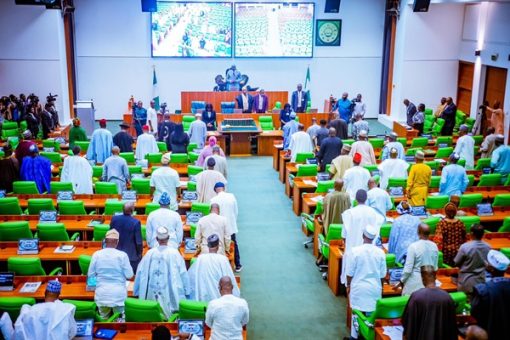
The House of Representatives has called on the Houses of Assembly in the six Southwest states to support the ongoing review and amendment of the country’s 1999 constitution.
Deputy Speaker Benjamin Kalu, who is the Chairman of the committee on the Constitution Review made the appeal in Ikogosi, Ekiti State, during a retreat for Speakers and principal officers of the State Houses of Assembly in the South West.
Kalu, who underscored the crucial roles the state assemblies play in ensuring successful alteration of the constitution, said they remained fundamental bodies to facilitate amendment of the existing legal framework.
He pledged the House’s commitment to work closely with the state assemblies in the ongoing constitution review exercise towards producing a more robust legal framework that would meet and satisfy the desires and yearnings of Nigerians.
The Deputy Speaker disclosed that the Committee on Constitution Review has received a total of 161 proposals from the memoranda submitted, saying the panel is assiduously working towards delivering the reviewed constitution by December 2025.
He said: “In the amendment or review of the constitution, there is a process that the constitution abides with, and one of them is the active participation of the state legislatures.
Read Also: Reps panel urges INEC to relocate offices from LG headquarters
“You cannot amend the constitution of the Federal Republic of Nigeria without the involvement of the state legislation. They occupy the cardinal, fundamental position in the structure of the amendment of the constitution.
“This visit is to strengthen our existing relationship. We are here today to see the Southwest Caucus of the Houses of Assembly to intimate them on the process and how far we have gone in our efforts to have a constitution reviewed by December 2025,” he added.
The Speaker of the Ekiti State House of Assembly and Chairman of Southwest Caucus, Hon Stephen Aribasoye hailed the National Assembly for collaborating with the legislative body, stressing that such synergy would foster unity and bring success in the process of constitutional review.
He added that the retreat was borne to foster cooperation among the Southwest region in ensuring that peer review and synergy thrive in the lawmaking process.
“You can’t have a constitutional amendment without the input of state legislation, which is 2/3 majority of the state House of Assembly have to agree before you can have any bill in Nigeria.
“The Current National Assembly has been very fair in ensuring that all stakeholders are carried along including the Houses of Assembly in Nigeria. No nation can strive without good laws and laws are made by the legislative arms of the government”, he added.
Ekiti State Governor, Mr Biodun Oyebanji, represented by the Secretary to the State Government, Abibat Adubiaro, applauded the Southwest Houses of Assemblies for being at the front burner of human development.
News
Group demands apology from Adeleke for defending murder suspect
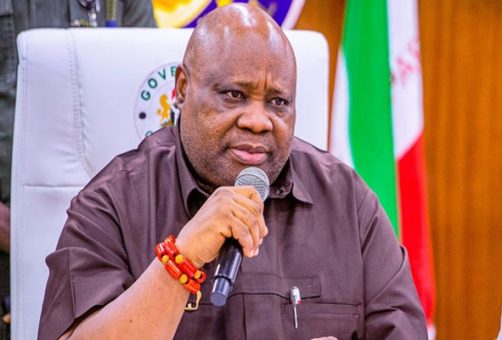
A Socio-Political group on Saturday demanded that Governor Ademola Adeleke should apologise to the leadership of the police and residents of the state for defending a murder suspect who engaged security operatives in a gun battle.
It will be recalled that an appointee of Adeleke, who is the head of Park Managers, Nurudeen Wakili was arrested but shot while attempting to escape from the police after a gun battle and ammunition were discovered in his car.
Reacting to the development, the group, Osun Progressives Youths (O-SPY), through its coordinator, Tunmise Ajiboye in a statement on Friday berated Adeleke’s stance about the incident.
He cautioned that, “Our governor must be wary of defending a suspect who was arrested with arms and ammunition who engaged in a gun battle before his arrest. Doing this will give residents the courage to bear one, hence anarchy has been invited by Osun number one citizen.”
He queried “How could one defend a murder suspect whose residents that the governor swore to protect had written several petitions against, over his threats and assaults on them?”
“We hereby urge Adeleke to apologize to police leadership and residents for defending the murder suspect, probably in error because he was his appointee.”
Meanwhile, Concerned Osun Civil Society Groups, led by Comrade Olanrewaju Stephen, berated police over the arrest and shooting of Alowonle, urging the IGP to probe the police team that carried out the operation.
-

 News1 day ago
News1 day agoJUST IN: Tinubu departs Brazil for Abuja
-
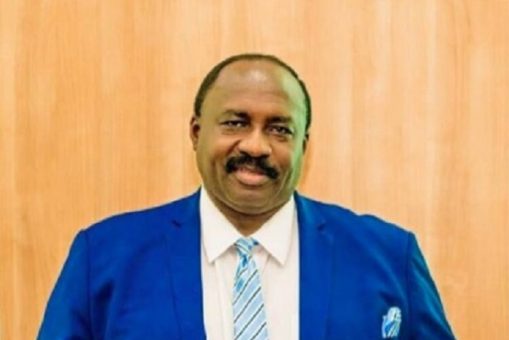
 News1 day ago
News1 day agoAirline operators urge Tinubu to confirm Najomo as NCAA boss
-

 News6 days ago
News6 days agoTax Reform: We consulted state governors, other stakeholders, says Taiwo Oyedele
-
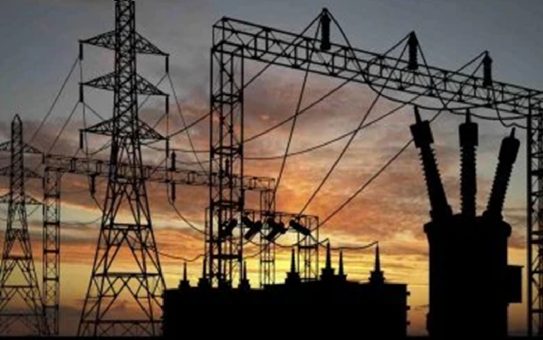
 News1 day ago
News1 day agoElectricity: Vandals strike again, destroy 31 transmission towers
-

 News1 week ago
News1 week agoBREAKING: Tinubu Speaks as Wike Welcomes Indian Prime Minister to Nigeria
-

 News1 day ago
News1 day agoPresidential aide highlights student welfare as core of Tinubu administration
-
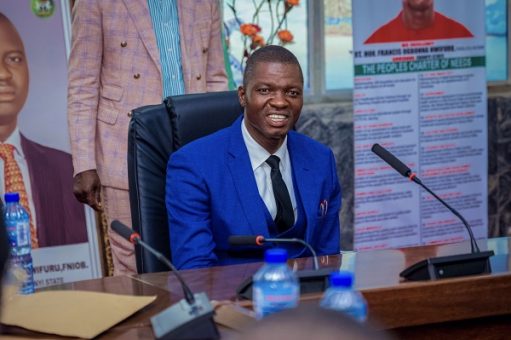
 News1 day ago
News1 day agoEbonyi begins data capturing of underage beggars, hawkers
-

 News9 hours ago
News9 hours agoOndo gov poll: S’West PDP urges IGP to probe allegedcompromise by security personnel
